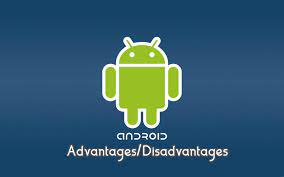Android is a mobile operating system developed by Google that is widely used on smartphones and tablets. It is built on the Linux kernel and is primarily designed for touchscreen devices.
One of the major advantages of using Android is its flexibility. Unlike Apple’s iOS operating system, which is only available on Apple devices, It can be found on various devices from various manufacturers. This means that users have a wider range of options when choosing a device that suits their needs and budget.
Another advantage of Android is that it is open-source, meaning developers can access and modify the source code. This has led to a thriving community of developers who build custom ROMs (modified versions of Android) and a wide selection of apps available on the Google Play Store.

A third advantage is that it generally offers more features and customization options compared to iOS. For example, Android access users to customize their home screens with widgets, change the default launcher, and use third-party keyboard apps.
However, there are also some potential drawbacks to using Android. One disadvantage is that because it is used on a variety of gadgets, there is often a significant variation in the quality of hardware and software. This can lead to some gadgets experiencing performance issues or having a shorter lifespan compared to others.
Another disadvantage is that it is more susceptible to malware relative to iOS. While Android has security measures in place, its open-source nature makes it easier for malicious it to slip through the cracks. Android users need to be vigilant about installing apps only from trusted sources and keeping their gadgets up to date with the latest security patches.
Overall, Android is a popular and feature-rich operating system that provides users with a lot of flexibility and adaptable options. Whether it is the right choice for you will depend on your specific requirements and preferences.
Also Read: What is iOS and the Pros & Cons of Using it?
Pros And Cons of Android:

It offers extensive adaptable options and a wide range of devices, making it versatile and accessible. Its open-source nature enables innovation but also leaves it weak to security risks.
The Google Play Store boasts an extensive collection of apps, yet fragmentation issues can lead to unstable user experiences.
While Google integration improves productivity, pre-installed bloatware and slowed software updates remain common concerns. Despite its drawbacks, Android continues to defeat the mobile market, offering users various choices and endless possibilities.
Here are some pros:
- Flexibility: It can be found on a wide range of devices from diverse manufacturers, giving users a wider range of options to choose from.
- Open-source: It is open-source, meaning developers can access and modify the source code. This has led to a successful community of developers and a wide selection of apps available on the Google Play Store.
- Customization options: It generally delivers more features and customization options compared to iOS, such as the ability to customize the home screen with widgets and change the default launcher.
- Widely used: It is the most widely used mobile operating system in the world, which means that there is a large user base and a wealth of online resources and support available.
- Regular updates: Google releases regular updates to Android, which usually contain new features and security improvements.
Here are some cons:
- Hardware and software variations: Because Android is used on a variety of devices, there is often a significant variation in the quality of hardware and software. This can lead to some devices experiencing performance issues or a shorter lifespan compared to others.
- Susceptible to malware: It is more susceptible to malware compared to iOS. While Android has security measures in place, its open-source nature makes it easy for malicious apps to slip through the cracks.
- Fragmentation: Because there are so many different Android devices available, it can be difficult for developers to ensure that their apps are compatible with all of them. This can lead to a phenomenon known as “fragmentation,” where some users are unable to access the latest apps or features because their devices are not supported.
- Limited control: While Android offers users more adaptable options relative to iOS, it also means that users have less control over the overall look and feel of the operating system.
- Carrier bloatware: Some Android devices come pre-installed with “bloatware,” or unnecessary apps and services added by the carrier. These apps can take up valuable storage space and may be challenging to uninstall.


